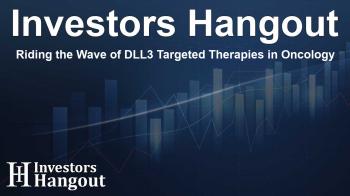Riding the Wave of DLL3 Targeted Therapies in Oncology

Emerging Trends in DLL3 Targeted Therapies
The delta-like ligand 3 (DLL3) targeted therapies market is experiencing a surge in interest and investment, largely due to the rising prevalence of small cell lung cancer (SCLC) and neuroendocrine tumors. As scientists and medical professionals continue to examine the intricacies of these conditions, exciting developments in DLL3-targeted therapies are on the horizon. The market's growth is supported by advancements in technology, especially in antibody-drug conjugates (ADCs), which are proving effective in treating these challenging cancers.
Market Overview and Key Insights
Recent analyses have shown that the DLL3-targeted therapies market, particularly across seven major markets, is poised for significant growth. Various biopharmaceutical companies are focusing on research and development that targets DLL3 due to its crucial role in tumor progression and resistance to chemotherapy. With more clinical trials taking place, there's a renewed sense of optimism about future treatments available for patients.
Investment and Collaboration
A notable feature of the current landscape is the increasing interest in DLL3-targeted therapies from biopharma companies. These organizations are not only investing in their own research but are forming strategic collaborations with other firms to expedite the development process. Such partnerships are vital as they combine resources and expertise, ultimately leading to more robust therapeutic options for patients.
Clinical Developments and Regulatory Milestones
Among the exciting advancements in the field, the recent approval of the first DLL3-targeted bispecific T-cell engager therapy, known as IMDELLTRA, stands out. This momentous occasion marks a turning point for many patients suffering from extensive-stage SCLC, providing them with a new and effective treatment option. As more therapies gain regulatory approval, the market is expected to open up to a wider range of innovative solutions.
The Competitive Landscape
The current landscape for DLL3-targeted therapies features a variety of companies actively engaged in clinical research. These include well-known biopharmaceutical giants and innovative biotech firms, all focused on bringing new therapies to market that leverage the potential of targeting DLL3. The development pipeline is rich with upcoming therapies aimed at improving outcomes for patients with SCLC and neuroendocrine carcinomas, which are often resistant to conventional treatments.
Pipeline Highlights
Several promising DLL3-targeted candidates are currently in various stages of clinical development. Among these are therapies such as Peluntamig (PT217), an intriguing first-in-class drug that demonstrates remarkable potential in targeting both DLL3 and CD47. Additionally, other treatments nurture hope through their unique approaches, each promising to tackle the complexities of SCLC and similar conditions.
Challenges Ahead
Despite these advances, the DLL3-targeted therapy market does encounter challenges that could impact its growth. One significant concern involves the heterogeneity of DLL3 expression in patients, which can lead to varying responses to treatments. Moreover, resistance mechanisms may pose additional hurdles, requiring ongoing research to overcome such barriers effectively. The safety of these therapies, especially concerning side effects like cytokine release syndrome, also remains a critical area of focus.
Personalized Medicine in Oncology
The emphasis on personalized medicine and biomarkers is increasingly reshaping the treatment landscape. As research progresses, strategies for selecting patients based on their DLL3 expression will become essential in enhancing treatment efficacy. This personalized approach not only aids in optimizing therapies but also in increasing their overall acceptance and success rates among healthcare providers.
Future Directions
Looking ahead, DLL3-targeted therapies could expand their applicability beyond SCLC, with emerging studies suggesting efficacy in other neuroendocrine tumors and even prostate cancer. Continued research and clinical trials may pave the way for these therapies to establish new standards of care, thereby broadening their reach and impact.
Frequently Asked Questions
What are DLL3-targeted therapies?
DLL3-targeted therapies are innovative treatments focused on targeting the DLL3 protein, primarily in aggressive cancers like SCLC and neuroendocrine tumors.
Why is the DLL3 market growing?
The growth is fueled by advancements in drug development, increasing collaborations in the biopharma sector, and the emergence of novel therapeutic pipelines.
What are the key challenges in DLL3-targeted therapies?
The main challenges include patient heterogeneity in DLL3 expression, potential resistance mechanisms, and concerns regarding safety during treatment.
Which companies are leading in DLL3-targeted therapies?
Leading companies include Phanes Therapeutics, Merck, Daiichi Sankyo, and other prominent biotech firms committed to advancing DLL3-targeted therapies in clinical settings.
What is the significance of personalized medicine in this context?
Personalized medicine ensures that therapies are tailored to individual patient profiles, thereby optimizing treatment effectiveness and improving overall patient outcomes.
About The Author
Contact Henry Turner privately here. Or send an email with ATTN: Henry Turner as the subject to contact@investorshangout.com.
About Investors Hangout
Investors Hangout is a leading online stock forum for financial discussion and learning, offering a wide range of free tools and resources. It draws in traders of all levels, who exchange market knowledge, investigate trading tactics, and keep an eye on industry developments in real time. Featuring financial articles, stock message boards, quotes, charts, company profiles, and live news updates. Through cooperative learning and a wealth of informational resources, it helps users from novices creating their first portfolios to experts honing their techniques. Join Investors Hangout today: https://investorshangout.com/
The content of this article is based on factual, publicly available information and does not represent legal, financial, or investment advice. Investors Hangout does not offer financial advice, and the author is not a licensed financial advisor. Consult a qualified advisor before making any financial or investment decisions based on this article. This article should not be considered advice to purchase, sell, or hold any securities or other investments. If any of the material provided here is inaccurate, please contact us for corrections.

